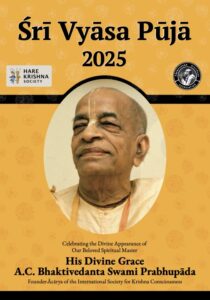SB 8.19.21-–The Personality of Godhead said: O my dear King, even the entirety of whatever there may be within the three worlds to satisfy one’s senses cannot satisfy a person whose senses are uncontrolled.
PURPORT-The material world is an illusory energy to deviate the living entities from the path of self-realization. Anyone who is in this material world is extremely anxious to get more and more things for sense gratification. … The purpose of controlling the senses is to stop one’s implication in the cycle of birth and death. … Therefore the Vedic culture or brahminical culture teaches one how to be satisfied with possessing the minimum necessities in life.
To teach this highest culture, varṇāśrama-dharma is recommended. The aim of the varṇāśrama divisions—brāhmaṇa, kṣatriya, vaiśya, śūdra, brahmacarya, gṛhastha, vānaprastha and sannyāsa—is to train one to control the senses and be content with the bare necessities. Here Lord Vāmanadeva, as an ideal brahmacārī, refuses Bali Mahārāja’s offer to give Him anything He might want. He says that without contentment one could not be happy even if he possessed the property of the entire world or the entire universe….The Kṛṣṇa consciousness movement is therefore establishing various farms, especially in America, to show how to be happy and content with minimum necessities of life and to save time for self-realization, which one can very easily achieve by chanting the mahā-mantra—Hare Kṛṣṇa, Hare Kṛṣṇa, Kṛṣṇa Kṛṣṇa, Hare Hare/ Hare Rāma, Hare Rāma, Rāma Rāma, Hare Hare.
SB 8.19.22-If I were not satisfied with three paces of land, then surely I would not be satisfied even with possessing one of the seven islands, consisting of nine varṣas. Even if I possessed one island, I would hope to get others.
SB 8.19.23-We have heard that although powerful kings like Mahārāja Pṛthu and Mahārāja Gaya achieved proprietorship over the seven dvīpas, they could not achieve satisfaction or find the end of their ambitions.
SB 8.19.24--One should be satisfied with whatever he achieves by his previous destiny, for discontent can never bring happiness. A person who is not self-controlled will not be happy even with possessing the three worlds.
PURPORT-If happiness is the ultimate goal of life, one must be satisfied with the position in which he is placed by providence. This instruction is also given by Prahlāda Mahārāja: sukham aindriyakaṁ daityā deha-yogena dehinām sarvatra labhyate daivād yathā duḥkham ayatnataḥ
“My dear friends born of demoniac families, the happiness perceived with reference to the sense objects by contact with the body can be obtained in any form of life, according to one’s past fruitive activities. Such happiness is automatically obtained without endeavor, just as we obtain distress.” (Bhāg. 7.6.3) This philosophy is perfect in regard to obtaining happiness.
Real happiness is described in Bhagavad-gītā (6.21): sukham ātyantikaṁ yat tad
“In the spiritually joyous state, one is situated in boundless transcendental happiness and enjoys himself through transcendental senses. Established thus, one never departs from the truth.” One has to perceive happiness by the supersenses. The supersenses are not the senses of the material elements. Every one of us is a spiritual being (ahaṁ brahmāsmi), and every one of us is an individual person. Our senses are now covered by material elements, and because of ignorance we consider the material senses that cover us to be our real senses. The real senses, however, are within the material covering. Dehino’smin yathā dehe: [Bg. 2.13] within the covering of the material elements are the spiritual senses. Sarvopādhi-vinirmuktaṁ tat-paratvena nirmalam: [Cc. Madhya 19.170] when the spiritual senses are uncovered, by these senses we can be happy. Satisfaction of the spiritual senses is thus described: hṛṣīkeṇa hṛṣīkeśa-sevanaṁ bhaktir ucyate. When the senses are engaged in devotional service to Hṛṣīkeśa, then the senses are completely satisfied. Without this superior knowledge of sense gratification, one may try to satisfy his material senses, but happiness will never be possible. One may increase his ambition for sense gratification and even achieve what he desires for the gratification of his senses, but because this is on the material platform, he will never achieve satisfaction and contentment.
According to brahminical culture, one should be content with whatever he obtains without special endeavor and should cultivate spiritual consciousness. Then he will be happy. The purpose of the Kṛṣṇa consciousness movement is to spread this understanding.
SB 8.19.25–Material existence causes discontent in regard to fulfilling one’s lusty desires and achieving more and more money. This is the cause for the continuation of material life, which is full of repeated birth and death. But one who is satisfied by that which is obtained by destiny is fit for liberation from this material existence.
SB 8.19.26–A brāhmaṇa who is satisfied with whatever is providentially obtained is increasingly enlightened with spiritual power, but the spiritual potency of a dissatisfied brāhmaṇa decreases, as fire diminishes in potency when water is sprinkled upon it.
Some Conclusions-This is a wonderful pastime of Lord Vamanadev. One reason in particular is that He teaches us self (soul) satisfaction-and not sense(body) gratification. The entire Vedic culture is meant to free the entangled soul from the meshes of Maya, or the webs of entanglement that we create ourselves like the silkworm which encapsulates itself in its own cocoon. Prabhupada came here to teach us to chant Hare Krsna and how to live in this world without entangling ourselves in more karmic reactions. Simple living and high thinking is best done away from the crowded cities and in rural life where one depends upon the Lord and makes his life one very simple-doing just enough to keep body and soul together. This means growing your own food supply and depending upon God and not factories or politicians.
Hare Krsna
damaghosa das
►740524r2.rom Conversations … Yes, naturally. If this man is fed up with this industry, he can go back to village and produce his own food. But he is attached to this industrial activity because he is thinking that “We are getting more money for wine and woman and meat. Let me enjoy.” That is the perfect, imp… But if he chants Hare Krsna maha-mantra, his consciousness will be purified and he will be made not interested this kind of work. He will go back to village and produce food.
►740621mw.ger Conversations Prabhupada: Most unnatural life. City life, most unnatural.
►761102rc.vrn Conversations Prabhupada: When men are uncivilized, they do not how to grow food, they kill animals in the jungle and eat. When they are civilized, they know how to grow food now and the nice food grains, fruit, flowers,
►760803r2.par Conversations … peas, grow fresh. Eat very nicely, keep strong, drink milk, chant Hare Krsna. Bas. Don’t depend on this outside work and then gradually become debauch, thief, rogues, prostitutes. Is that civilization?
June 22 1969 New Vrndavana…So our main business is how to improve Kṛṣṇa consciousness. We should not divert our attention in any other material condition of improvement. That is actually not improvement. It is simply illusion, that “I am making improvement.” What improvement? Suppose you are earning now, say, five hundred dollars per month. If you earn, say, five million dollars, so then what? Will you eat more than four cāpāṭis? (laughter) You’ll eat the same four cāpāṭis. And you’ll occupy the same six feet bed. You may acquire the whole property of West Virginia, (laughter) but you’ll have to lie down on six feet. (laughter) That’s all. And you’ll have to eat four cāpāṭis. So this is māyā. This is māyā, “I am improving.” What you are improving
garden video of our 3 gardens for Govinda
https://www.youtube.com/watch?v=ux6nYbexcEM
Our New book just released by Amazon




